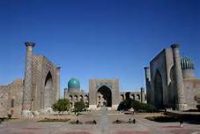President Shavkat Mirziyoyev of Uzbekistan and Early Steps
Noriko Watanabe and Lee Jay Walker
Modern Tokyo Times
The long rule of Islam Karimov in Uzbekistan ended after he passed away in September 2016. Not surprisingly, given the rigid nature of politics in Uzbekistan, he was replaced by the newly elected President Shavkat Mirziyoyev in later 2016. In other words, the prime minister since 2003 took over the mantle of Karimov based on a smooth transition of power. However, while the transition is smooth, it is equally true that certain conciliatory measures have been in the offing since Mirziyoyev took over the reigns of power.
Uzbekistan is situated in a very important geopolitical region for the competing powers of America, China, and the Russian Federation. Of course, ties linking Uzbekistan and the Russian Federation are of major importance. Despite this, America and China covet improved relations in relation to economics, politics, transportation links, and other essential areas. Similarly, with Uzbekistan sharing a border with Afghanistan, then issues related to the growing menace of ISIS (Islamic State – IS) and more traditional Sunni Takfiris, including the Taliban, means that terrorism and Sunni Islamist indoctrination – and narcotics – are all areas of concern.
Internally, vast numbers of nationals from Uzbekistan have migrated to the Russian Federation and further afield, in order to find work. This is tied with limited economic opportunities, public sector pay remaining low, and the elderly having insufficient pensions to face the reality of hardship for the poorest in society. At the same time, the closed political system means people have no real outlay to express discontent.
International Crisis Group says, “As acting president, he said he would stay true to Karimov’s course, yet he made several statements and gestures that suggested he would deviate from some of his predecessor’s policies. These included promises to improve difficult relations with neighbours, liberate the state-controlled economy with its foreign-currency black market and listen to the people, who had been deprived of their civil voice under Karimov’s heavy-handed rule.”
Since Mirziyoyev took over the reigns of power some political prisoners have been released. At the same time, the leader of Uzbekistan is seeking to reset the clock with Kyrgyzstan and Tajikistan. Meanwhile, internally, his visit to neglected regions of Uzbekistan is a sign that he understands the real plight of rural areas. Also, this enables the president to connect with people who feel abandoned. This bodes well providing new economic policies and greater support is followed through.
Of course, Mirziyoyev is connected to the old political processes under the long rule of Karimov. Yet, this doesn’t mean that Mirziyoyev will follow suit. Indeed, if he is genuine about reforming areas of society then at least he fully understands the working mechanisms. In other words, the competing power mechanisms within the Karimov system, cronyism, neglecting the infrastructure, restraints on economic liberalism, and other important areas of society, means that Mirziyoyev is fully aware of what blights Uzbekistan. Therefore, while it is too early to judge Mirziyoyev, it is equally fair to say that some signs of hope are emerging.
https://www.crisisgroup.org/europe-central-asia/central-asia/uzbekistan/242-uzbekistan-hundred-days
Modern Tokyo News is part of the Modern Tokyo Times group
DONATIONS to SUPPORT MODERN TOKYO TIMES – please pay PayPal and DONATE to sawakoart@gmail.com
http://moderntokyotimes.com Modern Tokyo Times – International News and Japan News
http://sawandjay.com Modern Tokyo Times – Fashion
https://moderntokyonews.com Modern Tokyo News – Tokyo News and International News
http://global-security-news.com Global Security News – Geopolitics and Terrorism
PLEASE JOIN ON TWITTER
https://twitter.com/MTT_News Modern Tokyo Times
PLEASE JOIN ON FACEBOOK

